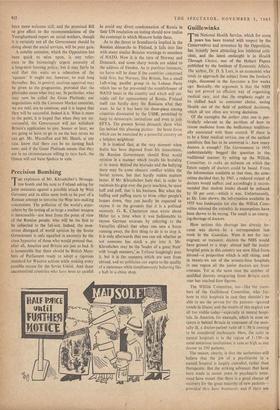Precision Bombing
Tan explosion of Mr. Khrushchev's 50-rnega- ton bomb and his note to Finland asking for joint measures against a possible attack by West Germany and its allies seem both to be part of a Russian attempt to terrorise the West into making concessions. The pollution of the world's atmo-, sphere by the testing of so large a nuclear weapon is inexcusable—not least from the point of view of the Russian people, who will be the first to be subjected to the fall-out. Indeed, the mon- strous disregard of world opinion by the Soviet Government is only equalled in enormity by the crass hypocrisy of those who would pretend that, after all, America and. Britain are just as bad. It is lamentable that there should be British Mem- bers of Parliament ready to adopt a rigorous standard for Western actions while making every possible excuse for the Soviet UniOn. And those uncommitted countries who have been so careful to avoid any direct condemnation of Russia in their UN resolution on testing should now realise the contempt in which Moscow holds them.
As to the threat to Scandinavia implied in the Russian demarche to Finland, it falls into line with many similar Russian warnings to members of NATO. Now it is the turn of Norway and Denmark, and some sharp words are added to the address of Sweden. As in previous instances, no harm will be done if the countries concerned hold firm, but Norway, like Britain, has a small Left-wing, pacifist group in its Labour Party which has so far prevented the establishment of NATO bases in the country and which will cer- tainly call for appeasement of Russia. Finland itself can hardly deny the Russians what they want. So far it has been the show-piece among countries dominated by the USSR, permitted to keep its democratic institutions and even to join EFTA. The present Soviet demands show what lies behind this pleasing picture: the brute force which can be exercised by a powerful country on a helpless neighbour.
It is ironical that, at the very moment when Stalin has been deposed from his mausoleum, the Russian Government should flout world opinion in a manner which recalls his brutality at its worst. Behind the bravado and the bullying there may lie some obscure conflict within the Soviet system, but that hardly makes matters better. If Mr. Khrushchev feels that, in order to maintain his grip over the party machine, he must huff and puff, that is his business. But when the huffing and puffing starts to blow other people's houses down, they can hardly be expected to excuse it on the grounds that it is a political necessity. G. K. Chesterton once wrote about Hitler (at a time when it was fashionable to excuse German excesses by referring to the Versailles diktat) that when one sees a horse running away, the first thing to do is to stop it. It is only afterwards that one can ask whether or not • someone has stuck a pin into it. Mr. Khrushchev may .be the 'leader of a great State' with ',rough manners,', as Tribune laughingly puts it, but it is the manners which are seen from abroad, and no politician can aspire to the quality of a statesman while simultaneously behaving like a bull in a china shop.














































 Previous page
Previous page